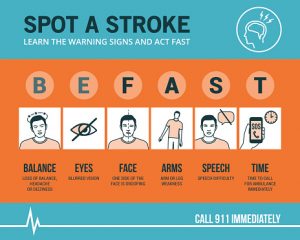
According to the Centers for Disease Control and Prevention, strokes are the third leading cause of death in the U.S. This is unfortunate, as strokes are largely preventable through a healthy lifestyle. However, we usually don’t take preventative measures until it’s too late.
What happens when you have a massive stroke (signs and symptoms)?
Having a stroke can be extremely scary. You may begin to slur your speech and become confused, and suffer from impaired physical, mental, and emotional functioning. Stroke symptoms vary depending on which area of the brain is affected, but there are some common physical symptoms that present themselves frequently. They are:
- Slurred speech
- Vision loss
- Incontinence
- Numbness
- Muscle weakness
- Inability to perform learned movements
- Appetite loss
Causes of massive brain stroke
Strokes can be caused by other conditions as well as unhealthy behaviors.
- Unhealthy diets can increase your risk of having a stroke. If your diet is high in salt and fat, you’re at a higher risk than those who eat healthy diets.
- Atherosclerosis is a condition in which fatty plaques build up in the blood. These plaques can be caused or worsened by an unhealthy diet.
- If you have a genetic condition that increases the likelihood of your blood clotting, you could experience a stroke.
- Drinking excess alcohol can cause a stroke, as it increases blood pressure and hardens arteries.
- Tobacco damages the blood vessels, increasing the likelihood of stroke.
- A lack of exercise can lead to obesity and diabetes, high blood pressure, and atherosclerosis—all contributing towards stroke chance.
- Diabetes increases glucose in the blood, which leads to blood clots.
- High blood pressure can damage arteries, raising the risk of stroke.
- Heart diseases, such as arrhythmia, can predispose someone to have more blood clots.
Massive stroke complications
Strokes can come with impairments and complications that typically affect mental health and are behavioral in nature. They include:
- Pain
- Depression
- Memory loss
- Paralysis
- Dizziness
- Difficulty controlling emotions
Prognosis for massive stroke
If you experience a massive stroke, your prognosis will depend on just how bad the stroke was. The time that your brain went without oxygen and how large the affected area was all contribute to the prognosis. The longer the brain goes without oxygen directly correlates to the extent of brain death you experience.
It also matters what type of stroke you’ve had, whether it’s an ischemic or a hemorrhagic stroke. Ischemic strokes occur when you have a blood clot in an artery of the brain—it could either be an embolus, which is a blood clot in the bloodstream, or a thrombus, which does not move. Another type of stroke, a hemorrhagic stroke, occurs when blood vessels rupture in the brain.
Ischemic strokes are easier to recover from because hemorrhagic strokes come with more complications.
Unfortunately, less than 50 percent of people who experience a massive stroke live for five additional years, and less than 10 percent survive hemorrhagic strokes. All survivors typically have some sort of disability afterward.
Massive stroke treatment and recovery tips
The aftermath of a stroke can be really difficult, and it varies greatly depending on the severity of the stroke experienced. Some people may recover quickly, while others could take up to six months or longer and still have disabilities as a result.
Massive stroke survivors typically require a host of medications and therapies to restore their function. You need to ensure that your blood does not clot so that you don’t experience another stroke.
If you are suffering from physical ailments, you may need to see a physiotherapist to work towards getting your body in order. Strengthening muscles and moving frequently during physical therapy are all great for preventing future blood clots. Occupational therapy is also recommended to restore your ability to do day-to-day tasks. Stroke survivors usually have family members or aid workers taking care of them, but through occupational therapy, some are able to take care of themselves again.
If you’re suffering from speech problems, speech therapy can help you restore your function to comprehend speech and speak yourself.
If your loved one has experienced a stroke, it’s important to remain patient with them and to offer as much support as you can. Realize that they are trying their best, and with the necessary support, they will once again be able to function and perform daily tasks.
Related: How to recover from a stroke quickly and naturally